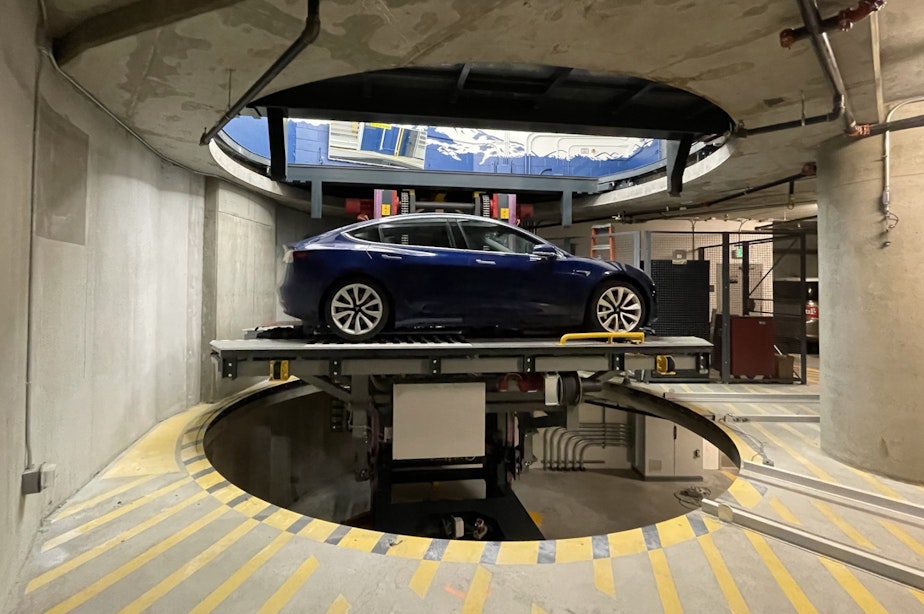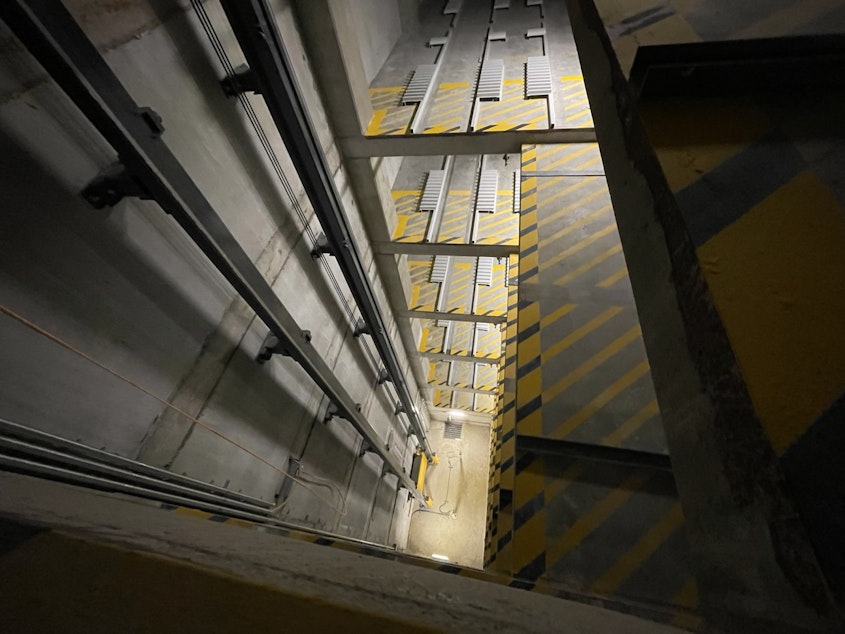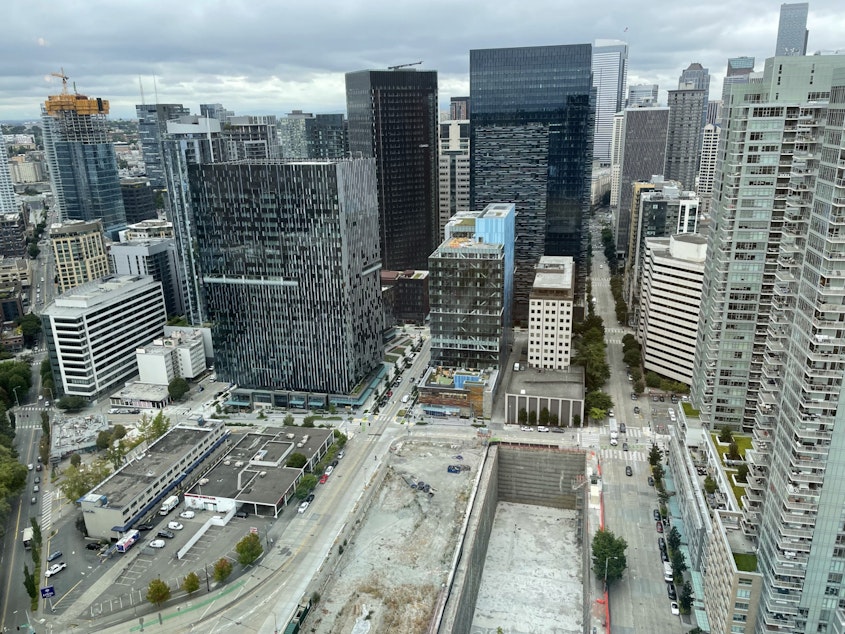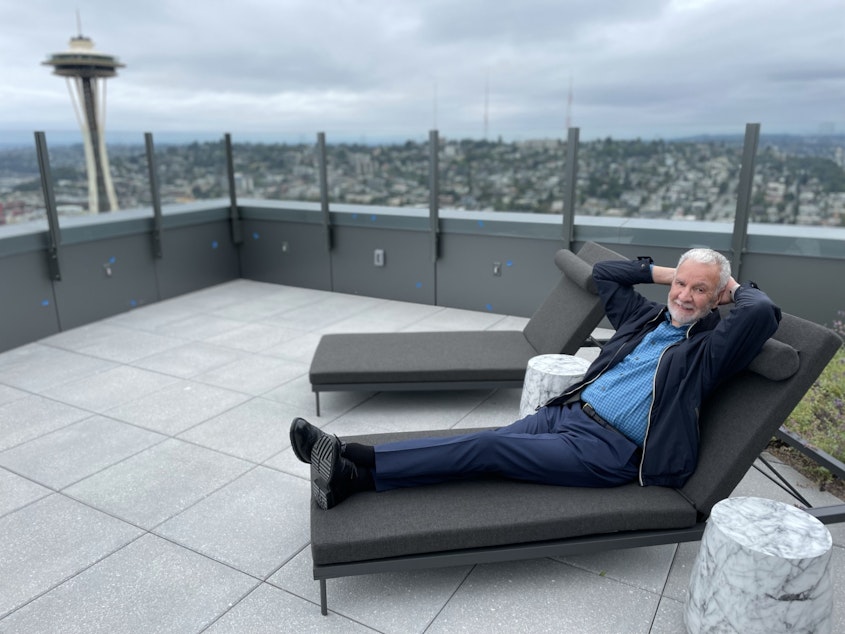Seattle's first robotic parking garage opens

Residents of this luxury Seattle tower drive their car onto a platform, exit the car, and punch in a code. Then their car disappears down a hole.
That's called "parking" at the Spire.
Upon seeing the technology demonstrated for the first time, most people say: "Whoa." And then they want to see what's down the hole.
“We’re the only ones that have a key to this door, because the parking system is a building-sized machine and no one should be in the lower basement levels while the machine is in operation, except skilled technicians and engineers," said Michael Dennison with the US company that distributes the Swiss-made robotic parking equipment.
Seattle's first automated parking system is part of the Spire, a 41-story luxury condominium tower constructed on the edge of Belltown, not far from the Space Needle.
Robotic garages like this may be new in Seattle, but they're an old hat in Switzerland.
Related: This robot garage in Seattle can be taken apart like LEGOs
Sponsored
The next level down from the surface is called the "transfer floor," and it's not unlike the inside of a cuckoo clock. Cars rose and fell on three different pistons, as residents on the floor above us picked up and dropped off their cars. Robotic trolleys carried these cars to and from a central lift, which went down another eight floors, each of them with their own trolley system, packing cars in slots, like an underground beehive.
"I'd love to get a photo of that," I said, leaning over the hole with my camera.
“You can," Dennison said. "Only thing is ... you will die, if you fall in the hole. So don’t fall in the hole.”
"I won't fall in the hole," I promised.

Sponsored
Paul Menzies is the CEO of Laconia, which developed the project. He says the automated garage takes up much less space. It doesn't need ramps or other pathways. Vertical circulation is highly efficient.
“This particular site is very small — 10,660 square feet," he said. "That’s about a quarter acre. So to give some perspective, that’s about as large as a lot for a single family home in the suburbs.”
Complicating matters even more — the site is triangular. A lot of local engineers told him you couldn’t fit an underground parking garage on this site. But a young engineer in Switzerland, working at robotic parking company Sotefin, had been studying Seattle's land use code and asked to take a crack at it.
“So he went away for half an hour and he came back with a set of, just hand drawings showing how, in fact, it could work when many people said it can’t be done," Menzies said. "This is one reason I love working with young people. They don’t know what can’t be done, so they do it anyway.”

Sponsored
This site is just two blocks from Amazon, so Menzies says a lot of software engineers have been asking for tours of the garage. He’s hoping that translates to sales of condos at Spire, which range from half a million to almost $4 million.
But demand hasn’t been as strong as he’d hoped. This spring, he had to drop prices by 10%.
Lots of buildings are being built in Seattle without parking garages these days. In Seattle's dense neighborhoods, city regulations don't require them anymore as they add to traffic congestion and cost a lot to build.
The Sightline Institute's Michael Anderson estimates that today, underground parking stalls in deep parking garages cost an average of around $100,000 per stall to build, including financing costs. Previous analyses by Sightline determined that downtown has a surplus of parking that goes unused during the day.
At least in the luxury condo market, "most people who live in the residential tower want to park in the building," Menzies said.
Sponsored

Remarkably, the robotic technology doesn't seem to have driven the cost of parking stalls much higher, at least in this case. Parking spaces in this building sell for $75,000. The robotic garage tech itself adds $8 million to the project, and the concrete work is more expensive as it must be poured with more precision than in a normal garage. But the efficient use of space means there's much less dirt to excavate, which saves a huge amount of money. Whether it completely offsets the extra costs associated with robots, Menzies couldn't say.
While this may be the first to open, Seattle will soon see more robotic parking garages. The Seattle Cancer Care Alliance will finish pouring concrete at the site of its robotic parking garage on Friday, August 27. That building is on track to open in 2023. And unlike Spire's parking garage, SCCA's system is designed in such a way that it can be converted to some other use, such as lab space, should parking become obsolete in the distant future.

